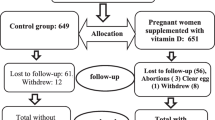Abstract
Aims and Objectives
This study was undertaken in order to study the combined effect of vitamin C and E supplements during pregnancy on the incidence of preeclampsia and to study its effect on neonatal outcome.
Materials and Methods
This study was conducted in Goa Medical College, from March 2010 to June 2011. Cases and controls were taken randomly from antenatal patients attending our hospital OPD. The study group included 200 pregnant women in second trimester (13 weeks onwards) and third trimester of pregnancy. Cases included 100 women who receive oral vitamin C in dose 500 mg and oral vitamin E in dose of 400 IU per day. Control group included 100 women who did not receive vitamin E and vitamin C. All women were advised not to take any other multivitamin supplements.
Conclusion
The incidence of preeclampsia in this study was 7 % in cases and 13 % in controls. Twenty out of the total 200 antenatal patients had developed preeclampsia. There was a 46 % risk reduction in the incidence of preeclampsia in cases as compared to controls. The incidence of severe preeclampsia in cases was 2 % and in controls was 7 %. This result showed 72 % reduced risk in the development of severe preeclampsia in cases as compared to controls. The study showed that significant number of antenatal patients developed preeclampsia in the age group 25–30 years, more so in controls. Primigravidas were at greater risk of developing preeclampsia than multigravidas in our study. The primigravidas in control group showed 36 % increased risk of developing preeclampsia as compared to cases. Out of 20 patients, 6 of them developed preeclampsia before 34 weeks and 14 patients developed preeclampsia after 34 weeks. There were more preterm deliveries in non-vitamin group as compared to vitamin-supplemented group. There was 46 % reduced risk in occurrence of preterm deliveries in vitamin-supplemented group, and this result was statistically significant. There was 50 % reduction in risk of stillbirths and neonatal deaths in vitamin-supplemented group, but this result was not statistically significant. The incidence of neonatal admissions was 10 % in cases and 16 % in controls. Hence, it is seen that there was 53 % reduced risk of neonatal admissions in cases, and this result was statistically significant. Controls were 1.26 times more prone for LSCS as compared to cases. Hence, we recommend routine vitamin C and E intake in all pregnant women, starting from 13 weeks of pregnancy onwards till delivery.
Similar content being viewed by others
References
Cunningham FG, Gant NF, Leveno KJ, et al. Hypertensive disorders of pregnancy. In: Williams obstetrics. 21st ed. New York: McGraw Hill, 2001, pp. 567–618.
Poston L, Briley AL, Seed PT, et al. For the vitamins in Preeclampsia (VIP) Trial Consortium. Lancet. 2006;367:1145–54.
Beazley D, Ahokas R, Livingstone J, et al. Vitamin C and E in supplementation in women at high risk for preeclampsia. Am J Obstet Gynaecol. 2005;192:520–1.
Chappell LC, Seed PT, Briley AL, et al. Effect of antioxidants on the occurrence of pre-eclampsia in women at increased risk: a randomised trial. Lancet. 1999;354:810–16.
Rumbold A, Duley L, Crowther CA, et al. Antioxidants for preventing pre-eclampsia. Cochrane Database Syst Rev. 2008;(1):CD004227. doi:10.1002/14651858.CD004227.pub3.
Rumbold AR, Crowther CA, Haslam RR, et al. Vitamins C and E and the risks of preeclampsia and perinatal complications. N Engl J Med. 2006;354(17):1796–1806.
Xu H, Perez R, Xiong X, et al. An international trial of antioxidants in the prevention of preeclampsia. Am J Obstet Gynaecol. 2010;202:239-e1–10.
Gulmezoglu AM, Hofmeyr GJ, Oosthuisen MMJ. Antioxidants in treatment of severe preeclampsia. Br J Obstet Gynaecol. 1997;104:689–96.
Klemmenson AK, Tabor A, Osterdal M, et al. Intake of Vitamin E & C in pregnancy and risk of preeclampsia. BJOG. 2009;116:964–74.
Author information
Authors and Affiliations
Corresponding author
Ethics declarations
Conflict of interest
Dr. Pia Muriel Cardoso and Dr. Sushama Surve declare that they have no conflict of interest.
Ethical Statement
All procedures followed were in accordance with the ethical standards of the responsible committee on human experimentation (institutional and national) and with the Helsinki declaration of 1975, as revised in 2008.
Informed Consent
Informed consent was obtained from all patients for being included in the study.
Additional information
Dr. Pia Muriel Cardoso is a Associate Professor in Department of Obstetrics and Gynaecology at Goa Medical College; Dr. Sushama Surve is a Senior Resident in Department of Obstetrics and Gynaecology at Goa Medical College.
Rights and permissions
About this article
Cite this article
Cardoso, P.M., Surve, S. The Effect of Vitamin E and Vitamin C on the Prevention of Preeclampsia and Newborn Outcome: A Case–Control Study. J Obstet Gynecol India 66 (Suppl 1), 271–278 (2016). https://doi.org/10.1007/s13224-016-0885-z
Received:
Accepted:
Published:
Issue Date:
DOI: https://doi.org/10.1007/s13224-016-0885-z



